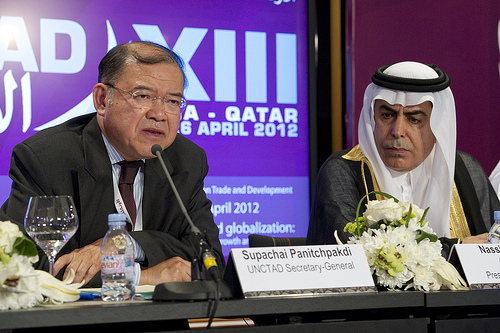So, today I went to UNCTAD. Well, not UNCTAD exactly. The pre-UNCTAD meetings. Mainly the World Civil Society Forum. Tomorrow UNCTAD officially opens, so today just had the sidecar meetings that take advantage of everyone’s presence in Doha.
The first meeting I went to was on the role of tourism in sustainable development. It was a series of speakers, followed by a panel discussion, and then question and answer at the end. Kind of a weird format, honestly. It made it hard for the audience to participate, and it didn’t have much of a flow.
There were a lot of generalities, but a few interesting ideas stuck out:
- One speaker suggested that hotel supplies and equipment get the same tax breaks that factories receive
- Most jobs in tourism are bad jobs, and we need to find a way to address that
- Small countries can use the web to promote tourism on a limited marketing budget
Next, I went to a session on developing new financial architecture. It started strong, with a stirring condemnation of the financial structures that led us into global financial crisis. It was genuinely exciting to watch someone strike out so hard against the existing financial establishment. I did some web research, though, and discovered this was not the first – or even the fifth – time this talk had been given. In its own heterodox way, it was old hat.
It also turned out that the session was about the need for new financial architecture, not possible systems for said architecture. I found that a little disappointing; I know we can’t just ignore the mistakes that led to global financial meltdown, but I also was hoping for a sense of what we can do in the future.
I closed the day by attending the press conference that preceded tomorrow’s opening plenary. The speakers were Nassir Abdulaziz Al-Nasser, President of the sixty-sixth session of UNGA and Supachai Panitchpakdi, UNCTAD Secretary General. Panitchpakdi took the opportunity to lay out his defense for UNCTAD’s existence and special role. Al-Nasser was less clearly on the defense, but no less firm in his case for UNCTAD. I did my best to accurately transcribe what they have to say, and toss it out on twitter, because I just don’t have the economics background to analyze on the fly. I could tell this much, though: Panitchpakdi was clearly feeling pressured to sell UNCTAD and its role.
That’s all for today. I’ll be writing up the opening presser in more detail for UN Dispatch.
Disclosure: My trip to Doha was funded by APCO, which has been contracted by the Qatari Ministry of Trade to support UNCTAD. They don’t have editorial control over my writing, and they don’t pay me to post.


The disclaimer has changed considerably. Who are APCO? And if they are not paying you to post here and on twitter, what are they paying you for? Or do you mean they pay you whether you post or not?
They are not paying me at all. They paid for my travel, my hotel, and a $25 per diem while I am in Qatar. That reimbursement is not linked to what – or if – I write.
Oh, and APCO is the PR agency hired by the government of Qatar to support UNCTAD.